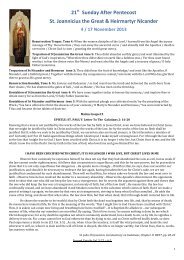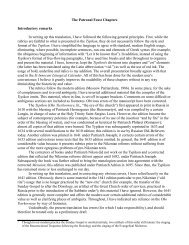9th Sunday After Pentecost Pochaev Icon of the Mother of God 23 ...
9th Sunday After Pentecost Pochaev Icon of the Mother of God 23 ...
9th Sunday After Pentecost Pochaev Icon of the Mother of God 23 ...
Create successful ePaper yourself
Turn your PDF publications into a flip-book with our unique Google optimized e-Paper software.
<strong>the</strong>ir death by martyrdom. They all suffered in about 305. St Anicetas and St Photius are invoked in <strong>the</strong> prayers at <strong>the</strong> blessing <br />
<strong>of</strong> oil and water; The Hieromartyr Alexander, Bishop <strong>of</strong> Comana: <br />
St. Muredach (Murtagh), first bishop <strong>of</strong> Killala & founder <strong>of</strong> Innismurray, <strong>of</strong> Ireland -‐ Muredach was an "old man", <br />
perhaps a presbyter or priest, in Saint Patrick's household. At <strong>the</strong> conclusion <strong>of</strong> his mission to <strong>the</strong> West Patrick left his <br />
companion to be bishop in W. Sligo and Mayo. One tradition says that at <strong>the</strong> end <strong>of</strong> his life he went to live as a hermit on <strong>the</strong> <br />
island <strong>of</strong> Innishmurray. We pray for companionship, for those who are lonely, and we give thanks for those who go to <br />
unfamiliar places in <strong>the</strong> service <strong>of</strong> Christ's mission. We pray also for <strong>the</strong> faithful members <strong>of</strong> <strong>the</strong> church in Co. Mayo and <strong>the</strong> <br />
north west <strong>of</strong> Co. Sligo especially as <strong>the</strong>y welcome visitors at holiday time. Powerful <strong>God</strong>, whose power holds us and leads us <br />
in <strong>the</strong> service <strong>of</strong> Christ and whose ear hearkens to our needs: like Muredach <strong>of</strong> Patrick's household, may we find Christ in <strong>the</strong> <br />
hearts <strong>of</strong> all that love us and in <strong>the</strong> mouth <strong>of</strong> friend and stranger. We ask this in Jesus' Name. <br />
13 / 26 August -‐ Apodosis <strong>of</strong> <strong>the</strong> Transfiguration-‐ Dormition Fast -‐ St Tikhon <strong>of</strong> Zadonsk-‐ born in 1724 in <strong>the</strong> village <strong>of</strong> <br />
Korotsk, in <strong>the</strong> Novgorod region, into a simple, peasant family, he received <strong>the</strong> monastic habit at <strong>the</strong> age <strong>of</strong> thirty-‐four and <br />
very soon, because <strong>of</strong> his ascesis and spiritual wisdom, was given higher and higher service until he was consecrated Bishop <strong>of</strong> <br />
Voronezh. He served as bishop for a little under seven years and <strong>the</strong>n, because <strong>of</strong> ill-‐health, retired to <strong>the</strong> monastery <strong>of</strong> <br />
Zadonsk and entered into rest <strong>the</strong>re in 1783. His wonderworking relics are kept <strong>the</strong>re to this day. A great ascetic <strong>of</strong> <strong>the</strong> <br />
Russian Church, he was a rare shepherd, a man <strong>of</strong> prayer and <strong>the</strong> writer <strong>of</strong> beautiful spiritual works. In his wisdom, his <br />
holiness and asceticism, he could be counted an equal <strong>of</strong> <strong>the</strong> great Fa<strong>the</strong>rs <strong>of</strong> <strong>the</strong> Orthodox Church <strong>of</strong> former times. Because <strong>of</strong> <br />
<strong>the</strong> many witnessed miracles that were performed over his relics, he was first proclaimed a saint by <strong>the</strong> people, and <strong>the</strong>n <br />
<strong>of</strong>ficially by <strong>the</strong> Church in 1861. <br />
Tropar, Tone 8: From thy youth thou didst love Christ, O blessed one, / and thou wast a model to all in word, life, love, spirit, <br />
faith, purity, and humility. / Wherefore, thou hast now taken up thy dwelling in <strong>the</strong> heavenly mansions / where, as thou <br />
standest before <strong>the</strong> throne <strong>of</strong> <strong>the</strong> Most Holy Trinity, / 0 Saint Tikhon, pray that our souls be saved. <br />
Ano<strong>the</strong>r Tropar, Tone 4: Instructor <strong>of</strong> Orthodoxy, teacher <strong>of</strong> piety, / preacher <strong>of</strong> repentance, zealot for Chrysostom, / most <br />
good shepherd, new luminary and wonderworker <strong>of</strong> Russia, / thou didst keep thy flock well, / and by thy writing hast thou <br />
instructed us; / wherefore being adorned by <strong>the</strong> Chief Pastor with <strong>the</strong> crown <strong>of</strong> incorruption, / do thou pray to Him that our <br />
souls be saved. <br />
Kondak, Tone 8: O Successor <strong>of</strong> <strong>the</strong> apostles, / adornment <strong>of</strong> hierarchs, teacher <strong>of</strong> <strong>the</strong> Orthodox Church; / pray to <strong>the</strong> Lord <strong>of</strong> <br />
all to grant peace to <strong>the</strong> world, and to our souls great mercy. <br />
Read what St. Tikhon has to say on perpetual repentance and correction <strong>of</strong> life: Death walks invisibly behind us, and <strong>the</strong> end <br />
will overtake us when we least expect it. Abide in perpetual repentance, <strong>the</strong>n, and be prepared for departure at all times and <br />
in every place. The wise servant always watches and waits till his master calls him. You, too, should watch and wait till Christ <br />
your Lord calls you, for He calls everyone through death. Then always be in your life what you wish to be at death. Always live <br />
piously and work out your salvation with fear and trembling (cf. Philip. 2:12). Always and everywhere proceed with caution <br />
and guard yourself, lest you be deprived <strong>of</strong> eternal salvation, which Christ our Lord obtained for us with His Blood and death, <br />
and so shall we have a blessed end. <br />
The Holy Martyr Hippolytus -‐ Hippolytus was a military supervisor and prison governor in Rome, born and brought up a <br />
pagan. When St Laurence <strong>the</strong> archdeacon was thrown into prison, Hippolytus was ordered by <strong>the</strong> Emperor to keep a strict eye <br />
on this prisoner. Hippolytus saw with his own eyes how Laurence restored <strong>the</strong> sight <strong>of</strong> <strong>the</strong> blind Lucillus and how he healed <br />
many o<strong>the</strong>r <strong>of</strong> <strong>the</strong> sick, and he became a Christian. When St Laurence baptised him, Hippolytus had a heavenly vision and said: <br />
'I see innocent souls in great joy'. He <strong>the</strong>n took Laurence into his own home, and all those in it were baptised, including his old <br />
nurse, Concordia; nineteen souls in all. When Laurence was slain for Christ, Hippolytus took <strong>the</strong> martyr's body by night, <br />
wrapped it in a winding-‐sheet and buried it. This somehow came to <strong>the</strong> ears <strong>of</strong> <strong>the</strong> Emperor Valerian, and, on <strong>the</strong> third day <br />
after Laurence's death, Hippolytus was arrested and taken before <strong>the</strong> Emperor. Refusing to deny <strong>the</strong> true Faith, he was struck <br />
on <strong>the</strong> mouth with stones. The Emperor <strong>the</strong>n ordered that he be stripped and flayed. Naked before <strong>the</strong> Emperor, Hippolytus <br />
said to him: 'You have not stripped me, but have begun to clo<strong>the</strong> me!' They <strong>the</strong>n threw him to <strong>the</strong> ground and flayed him <br />
mercilessly, but Hippolytus only cried out: 'I am a Christian!' The Emperor, hearing that Hippolytus and his whole household <br />
were Christians, ordered that <strong>the</strong>y all be brought. Old Concordia said: 'We prefer to die in honour in <strong>the</strong> Christian faith with <br />
our master than to live in dishonour with you.' She was killed first, and <strong>the</strong>n <strong>the</strong> o<strong>the</strong>r eighteen, all before Hippolytus' eyes. <br />
Finally, Hippolytus was bound behind a wild horse and dragged hi<strong>the</strong>r and thi<strong>the</strong>r, until <strong>the</strong> martyr gave his soul to <strong>God</strong>; Our <br />
Holy Mo<strong>the</strong>r, <strong>the</strong> Empress Irene; Our Holy Fa<strong>the</strong>r Seridus. <br />
14 / 27 August -‐ Forefeast <strong>of</strong> <strong>the</strong> Dormition – Dormition Fast -‐ The Holy Prophet Micah II -‐ <strong>of</strong> <strong>the</strong> tribe <strong>of</strong> Judah and from <br />
<strong>the</strong> village <strong>of</strong> Morasth, from which he took <strong>the</strong> name '<strong>the</strong> Morasthite', he was a contemporary <strong>of</strong> <strong>the</strong> prophets Isaiah, Amos and <br />
Hosea, and <strong>the</strong> Judean kings Jotham, Ahaz and Hezekiah. He denounced <strong>the</strong> vices <strong>of</strong> his people and denounced also <strong>the</strong> <br />
prophets who prophesied '<strong>of</strong> wine and strong drink'. He foretold <strong>the</strong> fall <strong>of</strong> Samaria, which would come about because <strong>the</strong> <br />
city's elders take a bribe and <strong>the</strong> priests teach for hire, and prophets divine for money. 'Therefore shall Sion for your sake be <br />
ploughed as a field, and Jerusalem shall become heaps'. But, <strong>of</strong> all his prophecies, <strong>the</strong> most important are those <strong>of</strong> <strong>the</strong> Messiah, <br />
and especially <strong>of</strong> <strong>the</strong> place <strong>of</strong> His birth. He named Bethlehem as <strong>the</strong> birthplace <strong>of</strong> <strong>the</strong> Messiah, 'whose goings-‐forth have been <br />
from <strong>of</strong> old, from everlasting' (5:2). It is not known certainly whe<strong>the</strong>r this prophet was killed by <strong>the</strong> Jews or died peacefully <br />
(see Jeremiah 26:18-‐19), but it is known that he was buried in his village, and that his relics were found, toge<strong>the</strong>r with <strong>the</strong> <br />
relics <strong>of</strong> <strong>the</strong> Prophet Habakkuk, in <strong>the</strong> time <strong>of</strong> <strong>the</strong> Emperor Theodosius <strong>the</strong> Great, by some mysterious revelation received by <br />
<strong>the</strong> Bishop <strong>of</strong> Eleu<strong>the</strong>ropolis.; The Hieromartyr Marcellus, Bishop <strong>of</strong> Apamea; St. Fachnan, abbot <strong>of</strong> Ross Carberry, Cork, <br />
Ireland (c. 600) <br />
3



